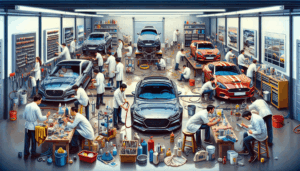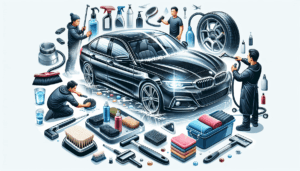Have you ever wondered what exactly “full car detailing” means? Well, let me give you a quick rundown. Full car detailing is not just a regular car wash, but a thorough and comprehensive cleaning and restoration process that aims to bring your vehicle back to its original glory. At Ace Mobile Detailing, located in Orange Beach, AL, they specialize in all kinds of detailing services, from cars to boats, RVs to aircrafts. Their team of fully licensed and insured professionals uses the best products on the market to ensure your vehicle or boat looks its absolute best. With their attention to detail and commitment to customer satisfaction, they strive to make you feel amazing whenever you hop into your freshly detailed vehicle.
Full car detailing refers to the thorough cleaning and restoration of a vehicle, both on the exterior and interior, to enhance its appearance and protect it from harmful elements. It involves various processes and techniques to ensure that every part of the car is meticulously cleaned and restored.

Exterior Cleaning and Restoration
Washing the car
The first step in full car detailing is washing the car’s exterior. This involves using a high-quality car shampoo and a soft sponge or mitt to gently remove dirt, grime, and stains from the surface. It is important to use a pH-neutral shampoo to prevent any damage to the paintwork.
Claying
After washing the car, the next step is claying. This process involves using a clay bar and a lubricant to remove contaminants embedded in the paint, such as tree sap, tar, and industrial fallout. Claying helps to achieve a smooth and clean surface, preparing it for the next step.
Polishing
Polishing is an essential step in full car detailing, as it helps to restore the paint’s shine and remove any swirl marks or light scratches. A machine polisher is usually used, along with a polishing compound, to gently buff the paintwork and bring back its original luster.
Waxing
After polishing, waxing is done to protect the freshly polished paint. Wax acts as a barrier against UV rays, water spots, and other contaminants, giving the car a glossy and slick finish. There are different types of waxes available, including carnauba wax and synthetic wax, each with its own benefits.
Sealing
To provide long-lasting protection for the car’s paintwork, a sealant is applied. Sealants create a durable shield on the surface, protecting it from UV rays, oxidation, and environmental pollutants. They also enhance the depth and gloss of the paint, giving the car a showroom-worthy appearance.
Interior Cleaning and Restoration
Vacuuming
The interior of a car can accumulate dirt, dust, and debris over time. Vacuuming is an essential step in full car detailing to remove all the loose dirt from the carpets, seats, and other hard-to-reach areas. It helps to create a clean foundation for the rest of the interior cleaning process.
Cleaning the upholstery
The next step is to clean and treat the upholstery, including the seats and any fabric surfaces. Specialized cleaning solutions are used to remove stains, spills, and odors, while also rejuvenating the fabric and restoring its original color and texture. For leather upholstery, a leather cleaner and conditioner are used to clean and nourish the leather, preventing it from drying out and cracking.
Cleaning the dashboard and console
The dashboard and console are often areas that accumulate dust, fingerprints, and grime. They can be cleaned using a gentle all-purpose cleaner and microfiber cloth. It is important to use cleaning products that are specifically formulated for cars to avoid any damage to the surfaces.
Cleaning the windows
Clean and streak-free windows are essential for good visibility while driving. To clean the windows, a glass cleaner and a soft microfiber cloth are used. It is important to thoroughly clean both the inside and outside of the windows to achieve a crystal-clear result.
Deodorizing
To eliminate any unpleasant odors inside the car, a deodorizing process is carried out. This involves using specialized odor eliminators that neutralize and remove unwanted smells, leaving the car smelling fresh and clean.
Engine Bay Cleaning
Degreasing
Cleaning the engine bay is an important part of full car detailing, as it not only improves the appearance but also helps to extend the life of the engine. Degreasing involves using a degreaser or engine cleaner to remove oil, dirt, and grime from the engine components. It is important to protect sensitive areas, such as electrical components, before applying the degreaser.
Cleaning with brushes and towels
Once the degreaser has been applied, brushes and towels are used to agitate and remove dirt and grime from the engine bay. Different brushes of varying sizes are used to reach all the nooks and crannies, ensuring a thorough cleaning.
Protecting with a sealant
After cleaning, a sealant or dressing is applied to the engine bay to protect it from dirt and moisture. This helps to keep the engine bay looking clean and prevents future build-up of dirt and grime, making it easier to maintain.
Wheel and Tire Cleaning
Removing dirt and grime
Wheels and tires often accumulate brake dust, dirt, and road grime, which can dull their appearance. Full car detailing includes a thorough cleaning of the wheels and tires to restore their shine. A wheel cleaner is used to loosen and remove the dirt, and a wheel brush is used to agitate the cleaner and reach all the tight spaces.
Cleaning the surface
After removing the dirt, the wheels and tires are further cleaned using a specialized tire and wheel cleaner. This helps to remove any remaining dirt and grime, leaving the surface clean and ready for the next step.
Applying tire dressing
To give the tires a glossy appearance and protect them from UV rays, a tire dressing is applied. The dressing is usually in the form of a gel or spray that is evenly applied to the tire sidewalls. It not only enhances the look of the tires but also helps to prevent cracking and fading caused by exposure to the sun.

Paint Protection
Applying ceramic coating
For the ultimate protection and shine, many opt to have a ceramic coating applied to their car’s paint. Ceramic coatings are liquid polymer coatings that bond with the paint, creating a strong protective layer. They provide long-lasting protection against UV rays, acid rain, bird droppings, and other contaminants, while also enhancing the car’s appearance with a deep gloss.
Applying paint sealant
Paint sealants are another option for paint protection. They are synthetic products that offer similar benefits to ceramic coatings, such as protection against UV rays and environmental contaminants. Paint sealants are easier to apply compared to ceramic coatings and can provide durable protection for several months.
Additional Services
Headlight restoration
Over time, headlights can become cloudy or yellowed, reducing their effectiveness and appearance. Headlight restoration involves using specialized products and techniques to remove the oxidation and restore the clarity of the headlights, improving visibility and the overall aesthetic of the car.
Odor removal
If there are any lingering odors inside the car, such as smoke or pet smells, full car detailing can include an odor removal process. This involves using ozone generators or odor-neutralizing products to eliminate the odors at the molecular level, leaving the car smelling fresh and clean.
Leather conditioning
For cars with leather upholstery, leather conditioning is an important step to keep the leather soft, supple, and protected. A leather conditioner is applied to the seats and other leather surfaces, nourishing the leather and preventing it from drying out, cracking, or fading.
Carpet and upholstery shampooing
In cases where the carpets and upholstery are heavily soiled or have stubborn stains, a deep shampooing process may be included in full car detailing. This involves using specialized carpet and upholstery cleaners, along with hot water extraction, to thoroughly clean and remove any deep-seated dirt or stains.
Benefits of Full Car Detailing
Improved appearance
One of the main benefits of full car detailing is the improvement in the car’s overall appearance. The meticulous cleaning and restoration processes help to remove dirt, stains, and imperfections, leaving the car looking clean, shiny, and showroom-worthy.
Increased resale value
Having a fully detailed car can significantly increase its resale value. A car that is well-maintained and looks in pristine condition will attract more potential buyers and demand a higher price in the market. Full car detailing helps to restore the car’s original appearance, making it more desirable to potential buyers.
Protection against environmental factors
Full car detailing includes the application of protective products, such as wax, sealants, and ceramic coatings. These products create a shield on the paintwork, protecting it against harmful UV rays, acid rain, bird droppings, and other environmental contaminants. This helps to prevent paint damage and oxidation, keeping the car looking fresh and new for longer.
Extends the lifespan of the vehicle
Regular full car detailing can help to extend the lifespan of a vehicle. By removing dirt, grime, and contaminants from both the exterior and interior, it helps to prevent corrosion, rust, and premature wear and tear. The protection provided by the detailing products also helps to maintain the integrity of the paintwork, upholstery, and other surfaces, prolonging their lifespan.
Frequency of Full Car Detailing
Every 6-12 months
As a general rule, full car detailing should be done every 6-12 months. This timeframe allows for regular maintenance and preservation of the car’s appearance and condition. However, the frequency can vary depending on factors such as usage, climate, and personal preference.
More frequently for high-use vehicles or harsh climates
For vehicles that undergo heavy usage, such as those used for daily commuting or commercial purposes, more frequent detailing may be necessary. Similarly, vehicles in harsh climates, where exposure to salt, sand, or extreme temperatures is common, may require more frequent detailing to counteract the effects of these elements.
Cost of Full Car Detailing
Varies based on vehicle size and condition
The cost of full car detailing can vary depending on the size and condition of the vehicle. Larger vehicles generally require more time and resources to detail, resulting in higher costs. Additionally, if the vehicle is heavily soiled or has extensive damage, additional time and products may be required, leading to increased costs.
Additional charges for specific services
Some additional services, such as headlight restoration, odor removal, or leather conditioning, may incur additional charges. These services may require specialized products or techniques, contributing to the overall cost of full car detailing. It is important to inquire about specific pricing for additional services before proceeding with the detailing process.
In conclusion, full car detailing encompasses a wide range of processes and techniques to thoroughly clean and restore both the exterior and interior of a vehicle. It not only improves the appearance of the car but also provides protection against environmental factors and prolongs the vehicle’s lifespan. With regular full car detailing, you can maintain your vehicle in top condition, enhance its resale value, and enjoy the satisfaction of driving a clean and pristine car.





